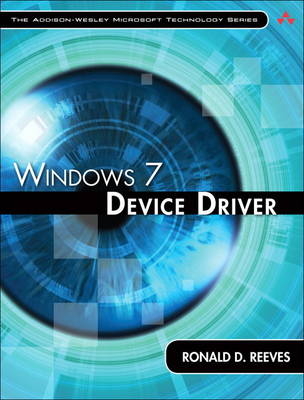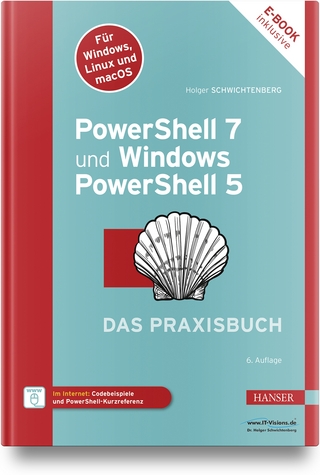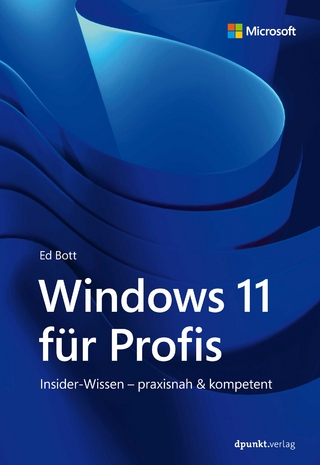
Windows 7 Device Driver
Addison-Wesley Educational Publishers Inc (Verlag)
978-0-321-67021-2 (ISBN)
- Titel ist leider vergriffen;
keine Neuauflage - Artikel merken
–Patrick Regan, network administrator, Pacific Coast Companies
The First Authoritative Guide to Writing Robust, High-Performance Windows 7 Device Drivers
Windows 7 Device Driver brings together all the information experienced programmers need to build exceptionally reliable, high-performance Windows 7 drivers. Internationally renowned driver development expert Ronald D. Reeves shows how to make the most of Microsoft’s powerful new tools and models; save time and money; and efficiently deliver stable, robust drivers.
Drawing on his unsurpassed experience as both a driver developer and instructor, Reeves demystifies Kernel and User Mode Driver development, Windows Driver Foundation (WDF) architecture, driver debugging, and many other key topics. Throughout, he provides best practices for all facets of the driver development process, illuminating his insights with proven sample code. Learn how to
Use WDF to reduce development time, improve system stability, and enhance serviceability
Take full advantage of both the User Mode Driver Framework (UMDF) and the Kernel Mode Driver Framework (KMDF)
Implement best practices for designing, developing, and debugging both User Mode and Kernel Mode Drivers
Manage I/O requests and queues, self-managed I/O, synchronization, locks, plug-and-play, power management, device enumeration, and more
Develop UMDF drivers with COM
Secure Kernel Mode Drivers with safe defaults, parameter validation, counted UNICODE strings, and safe device naming techniques
Program and troubleshoot WMI support in Kernel Mode Drivers
Utilize advanced multiple I/O queuing techniques
Whether you’re creating Windows 7 drivers for laboratory equipment, communications hardware, or any other device or technology, this book will help you build production code more quickly and get to market sooner!
Ronald D. Reeves, Ph.D., is founder and president of Software Genesis, LLC, a software development and consulting company based in Brighton, Michigan. He has forty years of experience designing and developing computer hardware, software, and drivers. He holds degrees in engineering and computer science, and is a nationally recognized author, consultant, and teacher. He coauthored Win32 System Services (Prentice Hall, 2001) and was technical reviewer for two leading books on writing device drivers. He currently teaches graduate courses in computer science at Lawrence Technological University and Cleary University.
Preface xv
About the Author xix
Introduction 1
Part I: Device Driver Architecture Overview 5
Chapter 1: Objects 7
1.1 Nature of an Object 7
1.2 What Is a Software Object? 8
1.3 Gaining an Understanding 10
1.4 Software Components 11
Chapter 2: Windows Driver Foundation (WDF) Architecture 13
2.1 WDF Component Functions 13
2.2 Design Goals for WDF 14
2.3 Device and Driver Support in WDF 15
2.4 WDF Driver Model 16
2.5 WDF Object Model 17
2.6 Plug and Play and Power Management Support 20
2.7 Integrated I/O Queuing and Cancellation 22
2.8 WMI Requests (Kernel Mode Drivers Only) 27
2.9 Driver Frameworks 28
2.10 Windows Kernel 32
2.11 Tools for Development and Testing 33
Part II: User Mode Drivers 39
Chapter 3: Windows 7 User Mode Drivers Overview and Operation 41
3.1 Devices Supported in User Mode 42
3.2 UMDF Model Overview 43
3.3 Driver Callback Interfaces 47
3.4 UMDF Driver Features 49
3.5 I/O Request Flow 51
3.6 I/O Queues 56
3.7 I/O Request Objects 60
3.8 Self-Managed I/O 67
3.9 Synchronization Issues 68
3.10 Locks 70
3.11 Plug and Play and Power Management Notification 70
3.12 Device Enumeration and Startup 71
3.13 Device Power-Down and Removal 72
3.14 Build, Test, and Debug 75
Chapter 4: Programming Drivers for the User Mode Driver Framework 79
4.1 Windows I/O Overview 79
4.2 Brief COM Information 81
4.3 UMDF Architecture 82
4.4 Required Driver Functionality 84
4.5 UMDF Sample Drivers 87
4.6 Driver Dynamic-Link Library and Exports 91
4.7 Functions for COM Support 95
4.8 Using the Skeleton Driver as a Basis for Development 106
Chapter 5: Using COM to Develop UMDF Drivers 111
5.1 Getting Started 111
5.2 Using UMDF COM Objects 116
5.3 Basic Infrastructure Implementation 120
Part III: Kernel Mode Drivers 127
Chapter 6: Windows 7 Kernel Mode Drivers Overview and Operations 129
6.1 KMDF Supported Devices 129
6.2 KMDF Components 131
6.3 KMDF Driver Structure 132
6.4 Comparing KMDF and WDM Drivers 132
6.5 Device Objects and Driver Roles 135
6.6 KMDF Object Model 139
6.7 KMDF I/O Model 147
Chapter 7: Plug and Play and Power Management 163
7.1 Plug and Play and Power Management Overview 163
7.2 Device Enumeration and Startup 164
7.3 WMI Request Handler 172
7.4 Synchronization Issues 173
7.5 Security 180
Chapter 8: Kernel Mode Installation and Build 183
8.1 WDK Build Tools 183
8.2 Build Environment 185
8.3 Building a Project 186
8.4 Building Featured Toaster 187
8.5 Installing a KMDF Driver 190 8.6 Catalog Files and Digital Signature 193
8.7 Installing Featured Toaster 194
8.8 Testing a KMDF Driver 196
8.9 Debugging Macros and Routines 203
8.10 WDF Debugger Extension Commands 204
8.11 Using WPP Tracing with a KMDF Driver 205
8.12 Using WinDbg with Featured Toaster 205
8.13 Versioning and Dynamic Binding 208
Chapter 9: Programming Drivers for the Kernel Mode Driver Framework 211
9.1 Differences Between KMDF and WDM Samples 216
9.2 Macros Used in KMDF Samples 218
9.3 KMDF Driver Structure and Concepts 219
9.4 A Minimal KMDF Driver: The Simple Toaster 224
9.5 Sample Software-Only Driver 235
Chapter 10: Programming Plug and Play and Power Management 243
10.1 Registering Callbacks 243
10.2 Managing Power Policy 248
10.3 Callbacks for Power-Up and Power-Down 250
10.4 Callback for Wake Signal Support 251
Chapter 11: Programming WMI Support 253
11.1 WMI Architecture 253
11.2 Registering as a WMI Data Provider 254
11.3 Handling WMI Requests 255
11.4 WMI Requirements for WDM Drivers 256
11.5 WMI Class Names and Base Classes 257
11.6 Firing WMI Events 260
11.7 Troubleshooting Specific WMI Problems 265
11.8 Techniques for Testing WMI Driver Support 268
11.9 WMI Event Tracing 269
Chapter 12: Programming KMDF Hardware Driver 273
12.1 Support Device Interrupts 274
12.2 Handling Interrupts 278
12.3 Mapping Resources283
Chapter 13: Programming Multiple I/O Queues and Programming I/O 291
13.1 Introduction to Programming I/O Queues 291
13.2 Creating and Configuring the Queues 293
13.3 Handling Requests from a Parallel Queue 298
13.4 Forwarding Requests to a Queue 302
13.5 Retrieving Requests from a Manual Queue. 303
13.6 Reading and Writing the Registry 308
13.7 Watchdog Timer: Self-Managed I/O. 312
Appendix: Driver Information Web Sites 323
Bibliography 331
Index 333
| Erscheint lt. Verlag | 1.12.2010 |
|---|---|
| Reihe/Serie | The Addison-Wesley Microsoft Technology Series |
| Verlagsort | New Jersey |
| Sprache | englisch |
| Maße | 179 x 229 mm |
| Gewicht | 602 g |
| Themenwelt | Informatik ► Betriebssysteme / Server ► Windows |
| ISBN-10 | 0-321-67021-3 / 0321670213 |
| ISBN-13 | 978-0-321-67021-2 / 9780321670212 |
| Zustand | Neuware |
| Haben Sie eine Frage zum Produkt? |
aus dem Bereich


